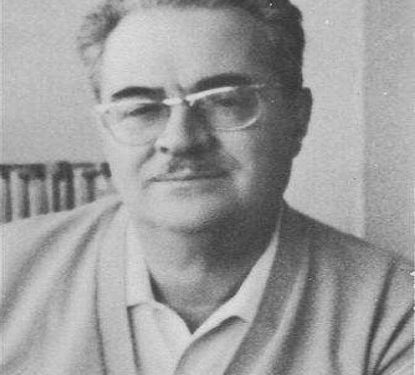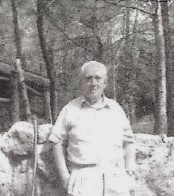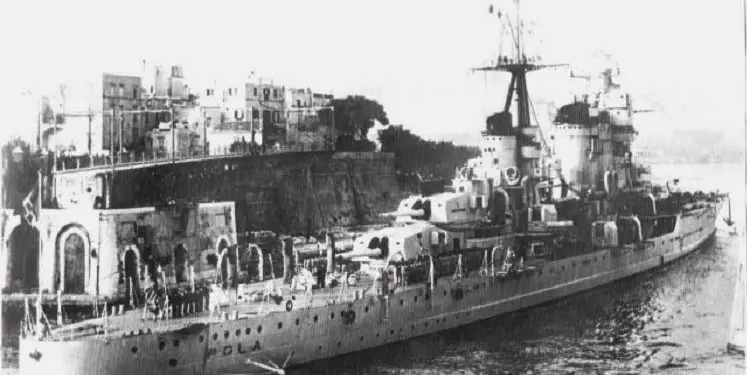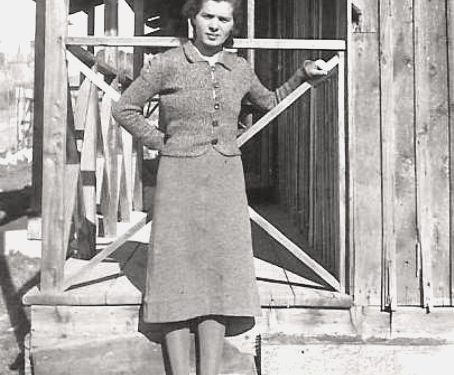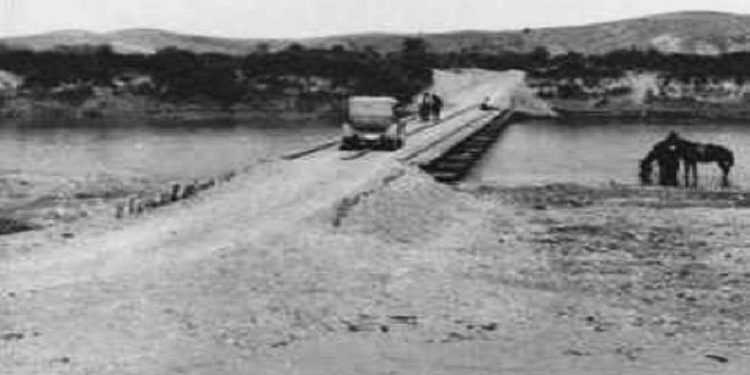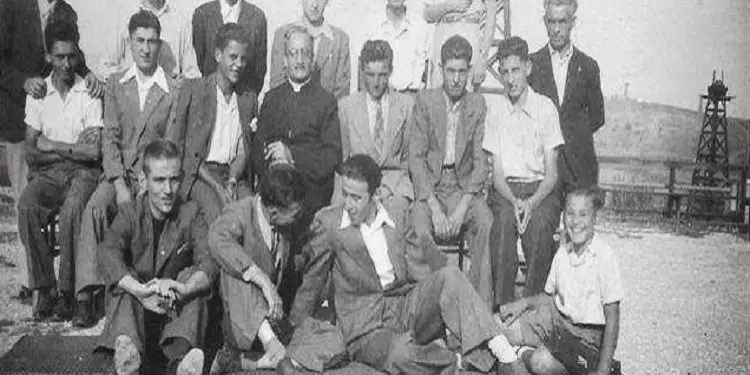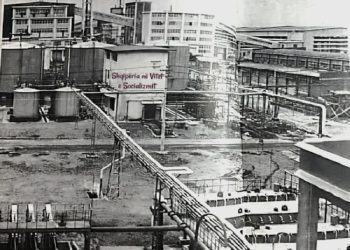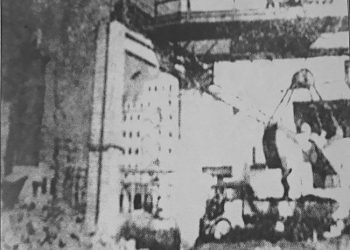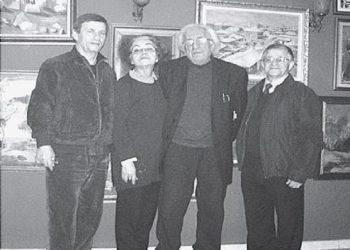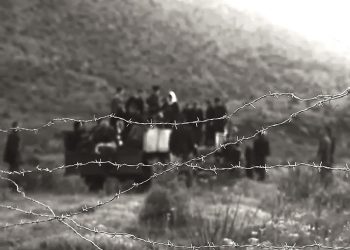By Arnaldo Canciani
Part Six
Memorie.al / This first part of my memoirs, which covers a period of twenty years; 1928 – 1949, I dedicate it to all those who have lived and suffered like me in Albania, to the inhuman privations and sacrifices of my parents and my entire family. I extend my dedication to the many Africans forced to emigrate in search of better living conditions, to all the soldiers who were forced to fight in a foreign country for fleeting ideals and, many of them, who never saw their families again and are buried in a foreign country, to all those who are oppressed by dictatorial regimes and those unjustly sentenced to death, to the prisoners, to those who have suffered unimaginable torture.
Continues from the previous issue
The Repatriation of Compatriots. The Lights of Hope are Lit…!
Around mid-January 1948, some compatriots were warned to be ready to leave. After a wait of several days in Durrës, the first group of 205 Italians began to embark on February 11, followed by another group on the 24th.
I learned later that three days before their departure, they were locked in a shed, where they were even inspected for feces, to recover any gold objects that may have been swallowed beforehand. They passed through customs in their underwear, and their luggage underwent a full inspection, where various valuable objects were sought. In June, the workshop where I worked was transferred to a new building, equipped with machinery from Germany, which had them as compensation for war damages.
The new factory was named “Uzina Enver Hoxha,” in homage to the general secretary of the Albanian Communist Party. The distance to walk to work doubled. At that time, there were no tram or bus services, and there were no bicycles either. For lunch, I had to deal with the mess that took place in the canteen. Sundays were the only day off. I don’t remember the exact date, but if I’m not mistaken, it was around mid-1948, when Yugoslavia was excluded from the union of communist countries.
Marshal Tito, in order to accept and practice communist doctrine, claimed a role of independence in his relations with Western countries. This behavior caused his exclusion and, consequently, the severance of diplomatic relations with Albania, which had remained faithful to Moscow. All Yugoslav citizens were expelled from Albania. These and other facts determined some small changes in the behavior of the Albanian government in its treatment of Italians.
First, economic changes: a salary equal to that received by the Yugoslavs and other former foreign workers; this increased the availability of money and created the opportunity for us to frequent the “Dajti” Hotel, which was reserved only for foreigners.
“Dajti” and “Vollga” in Durrës belonged to the “Grand Hotel Company,” built by the Italians before the war. An oasis of prosperity in a sea of misery. If I may be allowed to make a judgment about the intentions, I think I am correct in saying that this change in treatment for Italians was somewhat a calculated result.
Our status as semi-prisoners could not last forever, and the long-awaited moment of repatriation would come; some might even be tempted to stay. In the months that followed, the overall situation could be considered slightly improved. Twice a week, we found ourselves in the ballroom at “Dajti,” where a large orchestra brightened our evenings.
Upon request, they played rhapsodies and other genres of classical music; this would end in a small party. In this hall, I learned my first dance steps. I saw the birth of new loves and the end of some marriages: when the period of separation from the family exceeds certain limits, one cannot live on hope alone.
It was not allowed for women to have illegal relationships; they would be accused of prostitution and punished with forced labor for re-education. I often saw them on their way to work, escorted by the police; but these prostitutes were replaced by many mothers whose husbands were in prison and who were forced into prostitution to survive.
Careless men infected with venereal diseases, in order to get a cure, were forced to denounce the woman who had transmitted the disease to them. These strict measures imposed by the communist regime did not have the desired effect of eliminating the oldest profession in the world. On the only day of celebration, people didn’t have many options on how to spend their time: rest in the morning and an afternoon walk, in a crowd on the boulevard, in the two lanes that divided the city, passing from the large center to “Skënderbej Square” and the ministries at the top.
The Orthodox Church was located near the central intersection; in front, on the opposite side, was the “Londra” Hotel-Restaurant. I often came here to enjoy Turkish coffee, boiled in small tin pots, on a brazier built into the wall behind the counter. Those few lazy rich people didn’t come to public places very often; the police often pulled them in and forced them into forced labor for road maintenance.
The year 1948 passed quickly; the weekly visits to “Dajti,” in the company of many friends, helped to alleviate tensions and to create a veil of forgetfulness for the problems that surrounded us every day. My sister Albina and I were regular visitors to the hotel’s ballroom. After the re-evaluation of salaries, economic opportunities were not lacking, but there were no shops to buy goods and spend money in different ways.
Doctor Mandolini
I don’t know who informed me about the fate of Dr. Mandolini! He was sentenced to death, there had been an intervention by the Italian government, and the sentence was changed to one hundred and one years, and then reduced to twenty years, due to the interest of Di Vittorio, then secretary of the CGIL.
When I went for the first time to find him, in pavilion thirteen of the Civil Hospital for Infectious Diseases in Tirana, where he had agreed to practice his profession as a doctor just to get out of prison.
He came to me, but at first, I didn’t recognize him; he was wearing a tattered pair of pants and a jacket, shoes of a different color, and on his face, a lot of suffering was visible. I returned a few days later to bring him clothes that my mother had taken out of my father’s wardrobe. He was not allowed to leave the ward. In the following months, I spent several Sunday afternoons with him, and he told me the details of all the tortures he had endured.
Exhausting questions, threats to tell them what they were interested in, and hands always tied at the wrists, being held for hours, with bare feet in the water. Several days without food, the unbearable tickling of flour beetles on drinking cups, the marks of the cups were on his bare chest, he spent several days cleaning his hands with blocked toilets.
He had a very noble heart to cultivate the feeling of revenge. He was trusted to take care of the wounded, supporters of Commander Marcos, in the ongoing guerrilla war in Greece to overthrow the government and replace it with a communist one.
Two German officers, who were imprisoned with Mandolini for a while, had the task of donating blood for the hospital’s transfusion needs. One of them told me one day; “They need the blood of barbarians,” a clear allusion to the barbarism of the Albanians…!
In the first days of April 1949, on the occasion of the Easter holiday, Dr. Mandolini managed to get a special permit and participate with us in a dinner organized in the halls of the “Dajti” Hotel, with the participation of many compatriots. After the period of imprisonment, this was the first time that he accepted the possibility of returning to life.
I remember that at his request, the orchestra played one of his favorite songs: “Star Dust.” In the evening we parted with promises to meet again soon, I never would have imagined that several years would pass before I would meet him again.
I saw him the last time at the train station, Pesaro, in 1968. He told me he was going to work for Sinigallia; “the cementing of the column in a structure in the sea.” We had one hour, waiting for a phone call that called him; he hugged me immediately and ran. He died in 1972, but still lives in the memory of all those who knew him!!!
We Can Return to My Hometown!
On April 18, my father was warned to go immediately to Durrës and report for embarkation. For us, this was like a bolt from the blue; no one expected such a sudden decision, with only three days’ notice. The list of passengers consisted of 56 names; mine and my niece’s, Nina, were not included. I took a few days off from the factory; quickly preparing everything we could carry in our suitcases, the rest was abandoned.
After unsuccessful attempts to get a means of transport, we and others were forced to hire a carriage pulled by a skinny horse. We left Tirana on the evening of April 19; there was no time to warn or say goodbye to friends. Only an Albanian workmate, Petrit Toptani, a former nobleman turned worker by the regime, accompanied me on the road, walking next to the carriage; “Tell the truth to Italy about communism,” were the last words he said to me, out loud.
The journey continued throughout the night, with the clatter of the horse. About halfway, in the middle of an uphill stretch, we were forced to push the carriage; the load was too heavy for a malnourished horse. We arrived in Durrës on the morning of the 20th: we had spent twelve hours to travel 38 km. We were met by my brother-in-law, Kamoni, who had been notified by telegram.
He had come to say goodbye to his daughter, Nina, and gave permission to include her on the passenger list. As far as I was aware, the problem was solved without complications, as we were members of the same family. We spent the night at the “Vollga” Hotel, which is located opposite the sea, near the port. On the morning of the 21st, we got up and immediately looked out the windows, from where we could see the ships anchored in the port, but we couldn’t make out their nationality.
We were afraid that our stay in the hotel would be extended for days, perhaps weeks; this had already happened with the other groups that had been repatriated earlier. A few hours after our doubt and disbelief, the fear suddenly disappeared; we could not understand how such a miracle could happen in such a short amount of time.
At noon we were having lunch at the hotel, and then immediately, they came to pick us up and escort us to customs. Kamoni was not allowed to enter the entrance; he waved goodbye to us, waving a handkerchief.
In the late afternoon, we boarded the ship “Laura,” which was waiting for us at the dock. The mooring ropes of a large Soviet ship prevented our ship from using the onboard equipment for loading our luggage, and we had to pull them, using a gangway, at the risk of falling into the sea.
Some Russian sailors mocked and laughed at this action. The captain and crew of the “Laura” welcomed us very warmly; they immediately gave us drinks, white bread, and mortadella; which we had not used on our tables for a long time. Finally, we were able to give an answer to a series of events that were incomprehensible to us.
The captain informed us that we were the subject of an exchange with dozens of Albanians who were rescued on the coast of Puglia, who had disembarked in the morning. We saw them at Customs, isolated on a terrace and guarded by the police.
I never knew if it was a real sinking or an attempt to escape. The ship that took us was used to transport goods; it was not equipped with passenger cabins.
We were placed in a good spot, on a pile of mattresses. At night, we lay down in armchairs, we heard the noise of the propellers and the rocking of the ship from the waves which warned us that the long-awaited time had come, we had left Albania forever.
I think that night, no one could sleep. Early in the morning, we were all on deck. The small navy ship, which had waited at the border of territorial waters, passed by us quickly; the commander, with a megaphone, who gave the first greeting of the Homeland. Even today, after more than half a century, I get emotional when I remember this episode.
It was around 10:00 in the morning when we saw the “blessed land appears on the horizon, and we smelled the native air, which gave us the kiss of welcome”!
The ship dropped anchor in the port of Brindisi: our joy was great, even though it was covered by the long-awaited thought of returning home. “But as always in your eyes, freedom, the light shines that great light that saves the world. We will have faith in you even if they kill you!”
As we were waiting to get on land, people had gathered on the dock, waving red flags and hymning communism. Some of us responded with shouts for them to go to Albania to experience the fruits of their doctrine!
The verbal disputes further raised the tone, and when we descended the first steps, they turned into a brawl. A quick intervention separated us, and we ended up locked in the entrance of a large international hotel. Some agents of the information service asked questions on various topics; they wanted to know about the real situation in Albania. They were already aware of many details that we did not know.
Finally, we were divided into two groups: those who wanted to leave immediately with their families and others who chose to stay, waiting to be transferred to a refugee center for qualification, which gave them the right to the goods and benefits provided by law. Memorie.al




